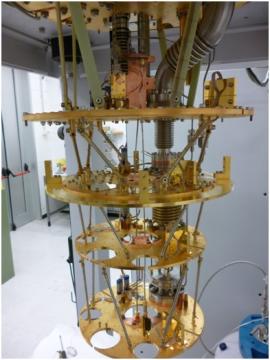
University of Milano-Bicocca funded an assistant professor position at the Physics Department “G. Occhialini” for a Quantum Technology project proposed by Prof. A. Nucciotti.
The goal of the project is the development of superconducting quantum devices for applications ranging from astroparticle physics to quantum computing. The project is in the framework of an initiative carried out by three Departments (Physics, Material Science, and Informatics) to strengthen Quantum Technology research and innovation in our University.
The initiative leverages also collaborations with national and international research institutes, such as Istituto Nazionale di Fisica Nucleare (INFN), Fondazione Bruno Kessler (FBK), Istituto Nazionale per la Ricerca Metrologica (INRiM), National Institute for Science and Technology (NIST), and Superconducting Quantum Materials and Systems Center (SQMS) at Fermilab.
Quantum Technologies exploit the manipulation of individual quantum systems to perform computation and measurements at unprecedented levels and to develop innovative materials. Quantum Technologies have immediate strong impacts on science, but they will also have relevant social and economic impacts.
The group led by Prof. A. Nucciotti over the last decade gathered the enabling technological skills for developing quantum computers and sensors based on superconducting qubits. This was made possible thanks to the fundamental research in Neutrino Physics supported by INFN, Fondazione Cariplo and European Research Council and conducted using low temperature detectors in the Cryogenic Laboratory at the Physics Department. The unique combination of enabling competences and research infrastructures, along with the new RTD-B, will be leveraged for an ambitious three pillar project: research and innovation, training, and technology transfer.
Research will start with the strengthening of the Dart Wars project (PI Dr. A. Giachero) to develop superconducting paramplifiers to control qubits and to read out low temperature detectors. The new generation of paramplifier, which will exploit novel materials studied in collaboration with the Material Science Department, and Josephson junction arrays will enable the scaling up of quantum computers based on superconducting qubits: an ambitious goal shared by those competing for quantum supremacy, such as Google or IBM.
More research projects will be carried out in collaboration with the Departments of Material Science and of Informatics and with the support of the Theory Group at the Physics Department: these projects will include the development of the photonics (non-classical photon sources and detectors) for Quantum Metrology and the development of tools for quantum computing based on superconducting systems (from transmon qubits to one-way quantum computers) useful also for studying new quantum algorithms.
The challenge for the next decade is to bring the Quantum Technologies from frontier research to the market. With this goal in mind, the project will put a special emphasis on the training to nurture new competences by expanding the university teaching programs. Starting from next Academic Year 7 new courses will be activated for the Master degrees in Physics, Material Science and Informatics, opening the way to new shared training paths in Quantum Technologies. In particular, an advanced experimental laboratory will allow hands-on training on superconducting devices such as the transmon qubits.
Research and training are starting points crucial for technology transfer. The project aims at initiating an inbound open innovation process through the enhancement of researchers with key skills, multidisciplinary and collaborative technological research that involves a wide spectrum of areas, and bottom-up entrepreneurial initiatives (e.g., start-ups and spin-offs) in the context of the research conducted in the University laboratories to concretize new technologies in the form of commercial devices.